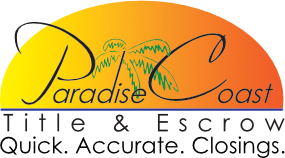When buying or selling a home in Florida, it’s essential to understand the various costs involved in the closing process. Knowing what to expect can help buyers and sellers budget effectively and avoid any last-minute surprises. This article breaks down the individual costs that make up the total at closing and explains why these expenses are necessary.
What Are Closing Costs?
Closing costs are the fees and expenses that buyers and sellers incur to finalize a real estate transaction. These costs are typically paid at the closing, the final step in the home buying or selling process where the property’s title is transferred from the seller to the buyer. Closing costs can vary widely based on factors such as the property’s location, purchase price, and the specifics of the transaction.

Breakdown of Common Closing Costs
1. Loan Origination Fees
What It Is: These are fees charged by the lender for processing the loan application and creating the loan.
Why It’s Necessary: Loan origination fees cover the lender’s administrative costs, including underwriting and funding the loan. It ensures that the lender can provide the necessary services to facilitate the mortgage process.
2. Appraisal Fees
What It Is: An appraisal fee is paid to a professional appraiser to determine the property’s market value.
Why It’s Necessary: Lenders require an appraisal to ensure that the loan amount does not exceed the property’s market value. This protects both the lender and the buyer by confirming that the property is worth the purchase price.
3. Home Inspection Fees
What It Is: A home inspection fee is paid to a licensed inspector who evaluates the property’s condition.
Why It’s Necessary: A thorough inspection identifies any potential issues with the property, allowing the buyer to make an informed decision and negotiate repairs or price adjustments if necessary.
4. Title Search and Title Insurance
What It Is: A title search fee is paid to verify the legal ownership of the property and to check for any liens or claims against it. Title insurance protects against future claims or disputes over the property’s ownership.
Why It’s Necessary: Ensuring a clear title is crucial to avoid future legal disputes. Title insurance provides peace of mind to both buyers and lenders by protecting against potential title defects.
5. Recording Fees
What It Is: Recording fees are paid to the local government to officially record the change of ownership.
Why It’s Necessary: Recording the deed and mortgage with the county provides a public record of the transaction, which is essential for establishing legal ownership and protecting property rights.
6. Attorney Fees
What It Is: Attorney fees are paid for legal services provided during the closing process.
Why It’s Necessary: Real estate transactions can be legally complex. Having an attorney review contracts, handle negotiations, and ensure all legal requirements are met can prevent costly mistakes and protect the parties’ interests.
7. Survey Fees
What It Is: A survey fee is paid to a surveyor who maps out the property’s boundaries.
Why It’s Necessary: A survey ensures that the property’s boundaries are correctly identified, which is crucial for avoiding disputes with neighbors and ensuring the buyer is getting exactly what they expect.
8. Escrow Fees
What It Is: Escrow fees are paid to the escrow company that manages the funds and documents during the closing process.
Why It’s Necessary: The escrow company acts as a neutral third party, ensuring that all conditions of the sale are met before the funds are disbursed and the title is transferred.
9. Prepaid Costs
What It Is: These include property taxes, homeowner’s insurance, and mortgage interest that may need to be paid in advance.
Why It’s Necessary: Prepaid costs ensure that the buyer is covered for property taxes and insurance from the day they take ownership. It also ensures that the lender has sufficient funds to cover these expenses.
10. HOA Fees and Transfer Fees
What It Is: If the property is part of a homeowners’ association (HOA), there may be fees for transferring the HOA membership and prepaying HOA dues.
Why It’s Necessary: Ensuring HOA dues are current and properly transferred is necessary for maintaining membership and access to community amenities and services.
Typical Closing Costs for Buyers and Sellers in Florida
For Buyers:
- Loan Origination Fees: Typically 0.5% to 1% of the loan amount.
- Appraisal Fees: Approximately $300 to $500.
- Home Inspection Fees: Around $300 to $500.
- Title Search and Insurance: Usually about 0.5% to 1% of the purchase price.
- Recording Fees: Approximately $100 to $200.
- Attorney Fees: Varies, often around $500 to $1,500.
- Survey Fees: Roughly $300 to $500.
- Escrow Fees: Typically split between buyer and seller, around $500 to $1,000 total.
- Prepaid Costs: Varies based on property taxes and insurance premiums.
For Sellers:
- Real Estate Agent Commissions: Typically 5% to 6% of the sale price, split between the buyer’s and seller’s agents.
- Title Search and Insurance: Usually covered by the seller in Florida, around 0.5% to 1% of the purchase price.
- Recording Fees: Approximately $10 per $1,000 of the sale price (documentary stamp tax).
- HOA Transfer Fees: Varies by HOA, generally $100 to $300.

Why Closing Costs Are Necessary
Closing costs are necessary to cover the various services and administrative tasks required to complete a real estate transaction. Each fee plays a critical role in ensuring the transaction is legal, fair, and transparent. They protect both parties by verifying the property’s value, ensuring legal ownership, and facilitating the smooth transfer of funds and documents.

Tips for Managing Closing Costs
- Request a Loan Estimate: Lenders are required to provide a Loan Estimate form within three days of receiving your mortgage application. This form outlines the estimated closing costs, giving you a clearer picture of what to expect.
- Shop Around: Some closing costs, like home inspections and title services, can vary. Shopping around for these services can help you find the best prices and potentially save money.
- Negotiate: In some cases, you can negotiate with the seller to cover part of the closing costs or request that the lender reduces certain fees.
- Budget Ahead: Plan for closing costs in advance by setting aside extra funds to cover these expenses. Being prepared can prevent financial stress during the closing process.

Conclusion
Understanding the breakdown of real estate closing costs in Florida is essential for buyers and sellers alike. These costs are necessary to ensure a smooth and legally compliant transaction. By familiarizing yourself with these expenses and planning accordingly, you can navigate the closing process with confidence and ease. Whether you’re buying your dream home or selling a property, knowing what to expect at closing will help you make informed decisions and avoid unexpected surprises.
